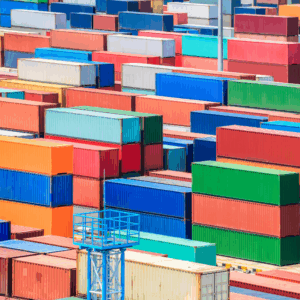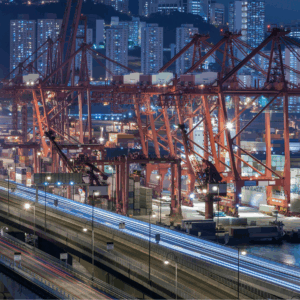 Navigating international freight transportation can feel overwhelming, with many players involved, from shipping lines to freight forwarders and carriers. Understanding the differences and how they collaborate is key to efficient logistics operations. This guide breaks down shipping lines vs. carriers, how shipping and freight forwarders work together, and why commercial shipping lines are essential for businesses today. We’ll also explore the best practices, answer the most common shipping questions, and show how ExFreight’s logistics services can simplify your international freight shipping needs.
Navigating international freight transportation can feel overwhelming, with many players involved, from shipping lines to freight forwarders and carriers. Understanding the differences and how they collaborate is key to efficient logistics operations. This guide breaks down shipping lines vs. carriers, how shipping and freight forwarders work together, and why commercial shipping lines are essential for businesses today. We’ll also explore the best practices, answer the most common shipping questions, and show how ExFreight’s logistics services can simplify your international freight shipping needs.
Understanding Shipping Lines and Their Role in Freight Transportation
What Are Shipping Lines?
Shipping lines are companies that own and operate ships that carry goods across oceans and seas. They are responsible for physically moving goods in containers between ports worldwide. Some well-known examples include Maersk Line, MSC, and CMA CGM.
Shipping lines usually handle large cargo volumes via ocean freight services, making them crucial players in international freight transportation. They provide scheduled services and operate massive fleets of cargo ships, including:
- Container ships for general goods
- Tankers for liquids
- Bulk carriers for unpackaged goods
- Refer ships for perishable goods.
Shipping Lines vs Carriers: What’s the Difference?
The terms “shipping lines” and “carriers” are often used interchangeably, but there’s a subtle difference:
- Shipping lines primarily refer to companies operating maritime vessels for ocean freight.
- Carriers are a broader term encompassing any entity (air, land, or sea) that physically transports goods. In this sense, shipping lines are carriers specialized in sea transport.

Shipping Lines and Freight Forwarders: Working Together for Efficient Freight Services
Freight forwarders like ExFreight act as intermediaries between shippers and shipping lines. They coordinate all aspects of the shipment process, from booking ocean space to handling documentation and ensuring customs compliance.
While shipping lines move the goods, freight forwarders add value through:
- Logistics services like cargo consolidation
- Freight services, shipping quotes, and management
- Customs Brokerage
- End-to-end tracking for greater visibility
This partnership ensures seamless international freight shipping services.
Why Are Commercial Shipping Lines Important?
Commercial shipping lines are the backbone of global trade and international freight transportation. Here’s why they matter:
Enhanced Cost-Effectiveness
Shipping large volumes via ocean freight reduces unit costs, making air or road transport cheaper.
Massive Cargo Capacity
A single cargo ship can transport thousands of containers, supporting businesses in moving extensive inventories internationally.
Eco-Friendly Freight Transportation
Ocean shipping produces fewer carbon emissions than air and land transport, making it a greener choice.

Modern vessels and strict maritime regulations ensure safe and reliable transit for diverse types of cargo, including hazardous materials.
Support for Global Supply Chains
Commercial shipping lines are critical in maintaining supply chain continuity by linking manufacturers, distributors, and retailers worldwide.
Best Practices for Effective Freight and Shipping with Commercial Lines
- Work with a Freight Forwarder: Choose experts like ExFreight to streamline the process.
- Automate Shipments: Use technology for quoting, booking, and tracking.
- Ensure proper documentation: Always have complete shipping documents, such as a bill of lading and customs forms.
- Choose the Right Shipping Line: Depending on the cargo type (perishable, hazardous, bulky), choose a line that specializes in your needs.
- Plan Ahead: Reserve container space early, especially during peak seasons.
Frequently Asked Questions (FAQ)
What are temporary imports or temporary exports?
Temporary imports/exports involve goods entering or leaving a country for a limited time without incurring standard customs duties. Examples include trade shows or repair items. ExFreight assists clients in managing such specialized shipments.
Which trucking services does ExFreight offer?
ExFreight provides domestic trucking within the U.S., including LTL (Less-than-Truckload), FTL (Full Truckload), and even specialized services for Amazon FBA deliveries.

Freight class categorizes shipments based on density, value, and handling requirements. It impacts pricing for freight services and shipping. ExFreight’s system automatically calculates the freight class based on weight and dimensions.
What happens after I book my import shipment?
Once an import shipment is booked with ExFreight, clients receive tracking updates, including real-time map visibility, automated email alerts, and easy document access via the online portal.
Additional Common FAQs from Google
How long does ocean freight shipping take?
Depending on the route, ocean freight can take 7 days (for shorter distances) up to 45 days for intercontinental shipping.
Is commercial shipping cheaper than air freight?
Ocean freight is significantly more cost-effective than air freight, especially for heavy and bulky cargo.
What is a Bill of Lading (BOL)?
A Bill of Lading is a legal document issued by a carrier to acknowledge cargo receipt for shipment. It’s crucial for tracking and ownership transfer.
Can I ship perishable goods internationally?
Yes, by using containers (refrigerated containers) on specialized ships.
Understanding the ecosystem of shipping lines, freight forwarders, and carriers is critical for mastering freight and shipping operations. Commercial shipping lines provide the vital infrastructure that keeps global commerce moving, making them essential for businesses large and small. Partnering with logistics experts like ExFreight ensures that your international freight shipping services are efficient and hassle-free.
Ready to simplify your freight and transport needs? Contact ExFreight today for instant quotes and seamless logistics services!



Leave A Comment
You must be logged in to post a comment.